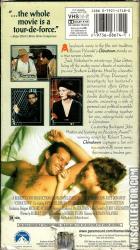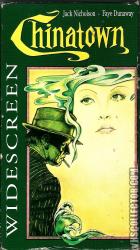Chinatown
Catalog Number
086741
-
Primary Distributor (If not listed, select "OTHER")
Catalog Number
086741
Primary Distributor (If not listed, select "OTHER")
Release Year
Country
N/A (NTSC)
N/A | N/A | N/A
N/A | N/A
Chinatown (1974)
Additional Information
Additional Information
"You may think you know what you're dealing with, but believe me, you don't," warns water baron Noah Cross (John Huston), when smooth cop-turned-private eye J.J. "Jake" Gittes (Jack Nicholson) starts nosing around Cross's water diversion scheme. That proves to be the ominous lesson of Chinatown, Roman Polanski's critically lauded 1974 revision of 1940s film noir detective movies. In 1930s Los Angeles, "matrimonial work" specialist Gittes is hired by Evelyn Mulwray (Faye Dunaway) to tail her husband, Water Department engineer Hollis Mulwray (Darrell Zwerling). Gittes photographs him in the company of a young blonde and figures the case is closed, only to discover that the real Mrs. Mulwray had nothing to do with hiring Gittes in the first place. When Hollis turns up dead, Gittes decides to investigate further, encountering a shady old-age home, corrupt bureaucrats, angry orange farmers, and a nostril-slicing thug (Polanski) along the way. By the time he confronts Cross, Evelyn's father and Mulwray's former business partner, Jake thinks he knows everything, but an even more sordid truth awaits him. When circumstances force Jake to return to his old beat in Chinatown, he realizes just how impotent he is against the wealthy, depraved Cross. "Forget it, Jake," his old partner tells him. "It's Chinatown." Reworking the somber underpinnings of detective noir along more pessimistic lines, Polanski and screenwriter Robert Towne convey a '70s-inflected critique of capitalist and bureaucratic malevolence in a carefully detailed period piece harkening back to the genre's roots in the 1930s and '40s. Gittes always has a smart comeback like Humphrey Bogart's Sam Spade and Philip Marlowe, but the corruption Gittes finds is too deep for one man to stop. Other noir revisions, such as Robert Altman's The Long Goodbye (1973) and Arthur Penn's Night Moves (1975), also centered on the detective's inefficacy in an uncertain '70s world, but Chinatown's period sheen renders this dilemma at once contemporary and timeless, pointing to larger implications about the effects of corporate rapaciousness on individuals. Polanski and Towne clashed over Chinatown's ending; Polanski won the fight, but Towne won the Oscar for Best Screenplay. Chinatown was nominated for ten other Oscars, including Picture, Director, Actor, Actress, Cinematography, Art Direction, Costumes, and Score.
Chinatown is a 1974 American neo-noir film, directed by Roman Polanski from a screenplay by Robert Towne, and starring Jack Nicholson and Faye Dunaway. The film was inspired by the California Water Wars, a series of disputes over southern California water at the beginning of the 20th century by which Los Angeles interests secured water rights in the Owens Valley. The Robert Evans production, a Paramount Pictures release, was the director's last film in the United States, and features many elements of film noir, particularly a multi-layered story that is part mystery and part psychological drama.
In 1991 the film was selected by the Library of Congress for preservation in the United States National Film Registry for films that are "culturally, historically, or aesthetically significant," and it is frequently listed among the greatest in world cinema.[4][5][6] The 1975 Academy Awards saw it nominated eleven times, with an Oscar going to Robert Towne for Best Original Screenplay. The Golden Globe Awards honored it for Best Drama, Best Director, Best Actor, and Best Screenplay. The American Film Institute placed it second among mystery films in 2008.
A sequel, The Two Jakes, was released in 1990, again starring Nicholson, who also directed, with Robert Towne returning to write the screenplay. The film failed to generate the acclaim of its predecessor.
Release Date: June 21, 1974
Distrib: Paramount
Boxoffice: $29,200,000 2014: $124,295,200
Chinatown is a 1974 American neo-noir film, directed by Roman Polanski from a screenplay by Robert Towne, and starring Jack Nicholson and Faye Dunaway. The film was inspired by the California Water Wars, a series of disputes over southern California water at the beginning of the 20th century by which Los Angeles interests secured water rights in the Owens Valley. The Robert Evans production, a Paramount Pictures release, was the director's last film in the United States, and features many elements of film noir, particularly a multi-layered story that is part mystery and part psychological drama.
In 1991 the film was selected by the Library of Congress for preservation in the United States National Film Registry for films that are "culturally, historically, or aesthetically significant," and it is frequently listed among the greatest in world cinema.[4][5][6] The 1975 Academy Awards saw it nominated eleven times, with an Oscar going to Robert Towne for Best Original Screenplay. The Golden Globe Awards honored it for Best Drama, Best Director, Best Actor, and Best Screenplay. The American Film Institute placed it second among mystery films in 2008.
A sequel, The Two Jakes, was released in 1990, again starring Nicholson, who also directed, with Robert Towne returning to write the screenplay. The film failed to generate the acclaim of its predecessor.
Release Date: June 21, 1974
Distrib: Paramount
Boxoffice: $29,200,000 2014: $124,295,200
Related Links






Comments0
Login / Register to post comments